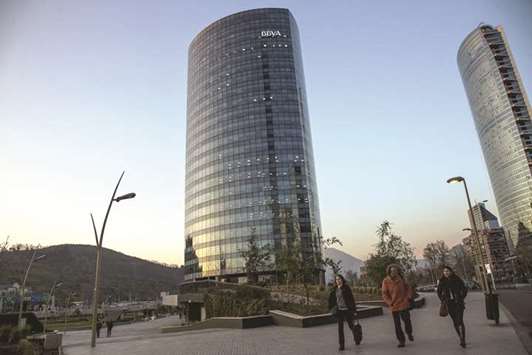Banco Bilbao Vizcaya Argentaria SA is among a group of five banks that were ordered by French judges to pay about €10mn ($11mn) in additional taxes after they all lost separate but similar lawsuits on the same day.
BBVA was the biggest loser as an appellate court in Versailles ruled last week it owed about 5mn euros in back taxes. Banco Santander SA was also ordered on November 6 to pay nearly €4mn, while Mizuho Bank and KBC Bank NV lost lawsuits worth a total of about 1mn euros. Bayerische Landesbank faces a €26,610 tax bill.
French officials have also been drawing ever bigger targets on banks in a series of unrelated high-profile cases. In a courtroom about 90 minutes away in Paris, prosecutors and the government are seeking as much as $6bn from UBS Group AG over allegations that the Swiss lender helped wealthy French residents hide money from tax collectors. Last year, HSBC Holdings Plc agreed to a 300mn-euro settlement in a similar probe.
In the Versailles case, the five banks had sued to overturn an exceptional charge that was imposed on companies with revenue of at least €250mn, or about $285mn, but the judges dismissed their requests.
The court said that authorities are entitled to take into account global revenue to calculate the tax owed by branches of a foreign company.
The dispute relates to the choice of foreign banks to open branches rather than subsidiaries to avoid oversight by financial regulators in both France and their home country, said Arnaud Tailfer, a tax lawyer at Arkwood SCP in Paris who isn’t involved in the cases.
But avoiding multiple watchdogs had an unintended consequence on taxes. Local revenue collected in France is the standard benchmark for subsidiaries, but branches are taxed on their global revenue.
Taking advantage of the European banking passport and operating in France via a branch enables financial institutions “to avoid having a second prudential control authority that sticks its nose in their solvency ratios and so on,” Tailfer said by phone.
A decade ago, tax became a buzzword to boost shrinking revenues for crisis-stricken authorities across Europe. This specific “exceptional charge” was set up in 2011 when Nicolas Sarkozy was France’s president and it was extended by the following government until 2016.
On the same day as BBVA, several other financial institutions had their lawsuits tossed at the Versailles court. Toyota Kreditbank GmbH, which provides financial services such as loan contracts, suffered the largest loss and was ordered to pay €2.3mn in back taxes.
Tailfer says the volume of litigation is owed to the fact that tax lawyers identified an opportunity to reverse the exceptional charge and offered their services across France’s financial hub.
But the battle was lost once the Conseil d’Etat, France’s highest administrative court, set the tone with a 2016 ruling that backed the position taken by tax authorities to calculate the tax owed based on the companies’ global revenue. Officials at BBVA in Spain couldn’t be immediately reached to comment.
From then on, financial institutions lost one lawsuit after the next with a string of defeats in 2017 in cases involving Royal Bank of Scotland Group Plc, Rabobank Groep and a JPMorgan Chase & Co unit, worth a total of about 3mn euros. Bank of Tokyo-Mitsubishi UFJ also suffered a loss worth 4.3mn euros that same year.
“This litigation relates to issues from way back when but clearly its outcome isn’t being decided at the best of time” amid efforts to make France attractive as the UK prepares to leave the European Union, Tailfer said.
The six-week UBS trial ended on Thursday evening after closing speeches from the bank’s lawyers arguing that prosecutors submitted no proof that anyone tried to help French citizens dodge taxes despite more than half a decade of investigations. The ruling in the UBS case is expected on February 20.

Pedestrians pass in front of Banco Bilbao Vizcaya Argentaria headquarters in Santiago, Chile. BBVA is among a group of five banks that were ordered by French judges to pay about u20ac10mn in additional taxes after they all lost separate but similar lawsuits on the same day.
